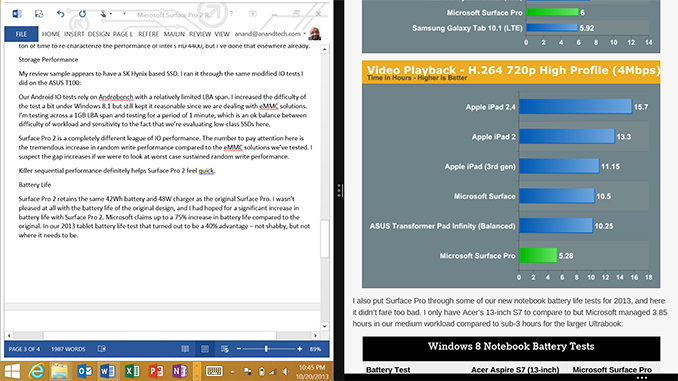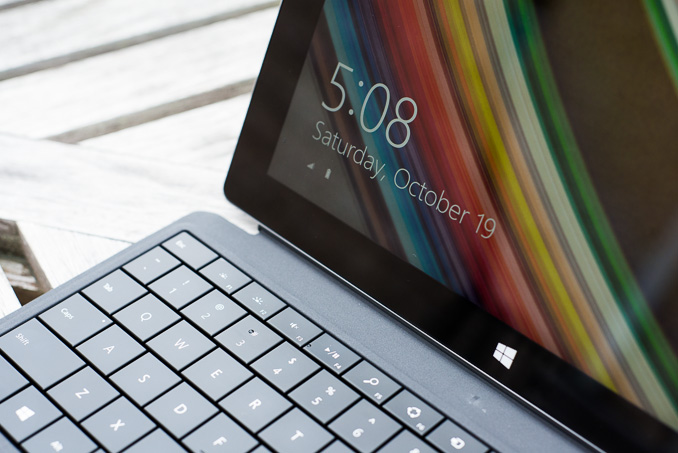Microsoft Surface 2 Review
by Anand Lal Shimpi on October 21, 2013 12:00 AM ESTFinal Words
Surface 2 is a big step forward compared to Surface RT. The chassis looks awesome, the device is significantly quicker and battery life is appreciably better. The new display is much better than its predecessor (and so much better than what you get from most $449 PCs). The new touch/type covers see similarly major improvements. Surface 2 also benefits from the update to Windows RT 8.1, giving it a far more polished OS than what launched a year ago. The overall package is just a lot better than it was last year.
Unfortunately, Surface 2 faces the same struggles as its predecessor – primarily around the limited use of Windows RT. You’ll still get a better third party app experience on Android or iOS. The good news is that Microsoft’s first party apps are much better with 8.1. With Surface 2 Microsoft offers a potentially more productive environment courtesy of Windows RT 8.1’s ability to display two windows at once, not to mention the benefits of having an integrated kickstand and cover options that double as excellent keyboards. Finally there’s the benefit of having Office RT 2013 on the device as well. I can't stress just how much more productive you can be on Surface than any other 10-inch tablet. The only issue with Surface 2 is that productivity is limited to Office 2013 and a smaller list of applications compared to Surface Pro 2.
It’s definitely a tough sell for the majority of the ARM based tablet market. I feel like at a lower price (and/or with a cover thrown in as part of the bundle) Surface 2 would have a much easier time attracting more than a niche. I can’t help but draw comparisons between Surface 2 and a modern day Chromebook. Both are limited in the sort of applications they can run, but whether or not they are suitable for you depends on how valuable Google/Microsoft browsers and services are to you. Surface 2 can be a fine recommendation – if the price is right. I’d love to see Surface 2 with type cover retail for $399, I feel like at that price point it’d be at least a competitive sell.
I really like everything about Surface 2 as a physical device. The chassis, the weight, the kickstand, the feel, everything. The software/services side of the story needs work, and until it gets there that puts a good amount of pricing pressure on Microsoft – at least if it wants broad adoption. There is an alternative solution to this entire problem however. I can’t help but feel like if Microsoft threw Intel’s Bay Trail in the Surface 2 chassis that a number of users might come to a completely different conclusion about the device. When we first posted about ASUS’ T100, common feedback was that users would be willing to pay more for an even better device. A Bay Trail Surface 2 could’ve been that device.












139 Comments
View All Comments
Daniel Egger - Monday, October 21, 2013 - link
Have you actually looked around in the Store? Half a dozen Solitaire clones and a few Poker games but that's about it. He prefers playing more exotic Solitaire versions, Skat, Schafkopf, Doppelkopf, Bridge -- in a nutshell anything that's not Klondike or Poker and you wouldn't believe how many CDs and DVDs with Windows games he has that actually contain hundreds to thousands *unique* card games.Wolfpup - Thursday, October 31, 2013 - link
I'm SERIOUSLY considering buying Surface 2 for exactly this reason, BUT I'm still paranoid she's going to be able to break it, install malware from the Windows store or SOMETHING...chizow - Monday, October 21, 2013 - link
Really wish there was a Bay Trail-T in this Surface 2 chassis, I'd pay $500 for that in a heartbeat for the full x86 Win8.1 support. I still feel Surface Pro 2 is too expensive for what it is, but Windows RT just isn't flexible enough with app support to drop to the ARM-based Surface 2.Instead I'll probably look at the Asus Transformer T100 instead.
Braumin - Monday, October 21, 2013 - link
On the last go around, I would have agreed with you. The Surface RT should have come with Clovertrail - it was faster than Tegra 3, and the app store was pretty much empty on day 1.Now though, I have an use a Surface RT (just upgraded to 8.1) and honestly I don't think x86 is really needed in this kind of device. The desktop is not great with touch, nor with something this small. The app store is way better than it was now. The graphics performance of Tegra 4 is way better than Bay Trail too. CPU performance is still lower of course.
Also, this go around there seems to be some excellent choices on the OEM side which are all using Bay Trail, so if a guy wants x86, there's plenty of choice! The Dell Venue Pro 11 looks excellent, and I'm interested in seeing how the 8" tablets do. The price is certainly right from both Dell and Lenovo. Last year, the OEMs didn't know what to make so everything they made did flips and twists, and no one really made a good tablet.
stanwood - Monday, October 21, 2013 - link
Braumin, you touch on exactly the issue I'm facing in choosing an inexpensive tablet for my mother. Like most people, she is not shopping cross-platform. It's going to run Windows. But should it be a Surface 2 with Tegra 4 or maybe a Venue Pro 11 with Bay Trail? While I appreciate the performance comparison with ARM tablets here I hope we see a Bay Trail table review with comparisons to Surface 2.Braumin - Wednesday, October 23, 2013 - link
It's a tough call I would wait and see what the Venue Pro 11 looks like. The RT side though is perfect for people who don't need to run x86 apps. It's going to get no viruses, it won't get bloated over time. They won't be able to install junk in the browser or system tray that slows the machine down and kills the battery.Personally I'd get a Surface 2, or possibly a Lumia 2520. They cost a bit more but the quality of the Surface is really at the top end.
heelo - Monday, October 21, 2013 - link
"I’d love to see Surface 2 with type cover retail for $399, I feel like at that price point it’d be at least a competitive sell."Part of me thinks that MS needs to stay the course here with the "premium tablet as budget laptop" approach that they've adopted with the Surface RT models. I feel like the "one device instead of two" marketing pitch requires a premium angle, and I think that's the build quality and fit and finish. With this approach, MS doesn't have the same luxury the Android competitors had in being able to undercut the iPad by actually selling less device (not to mention the fact that MS needs to run the program with legitimate P&L considerations, rather than zero-margin strategic market initiatives like the Nexus and Kindle programs).
Yet another part of me agrees with Anand, and believes that "Surface + cover for $399" should be a design requirement for Surface 3.
Perhaps the answer is for MS to create a Nexus-like program where they partner with certain OEMs and have them produce $299-level 10" RT devices that have their own (presumably less robust) kickstands and incorporate the Surface keyboard cover connectors? It may not be possible to produce something viable at that price point today, but maybe next summer?
flyingpants1 - Monday, October 21, 2013 - link
Well price competition is pretty important. At $399 it would compete price wise with the Nexus 10, and $100 cheaper than an iPad, maybe then some people would actually buy it.savagemike - Monday, October 21, 2013 - link
With a type cover then probably closer to $200 cheaper and I think that is where they'd need to be.savagemike - Monday, October 21, 2013 - link
The problem is that the Surface with keyboard cover is pretty much the same money as an iPad with any number of keyboard covers which are available for it. It might come in $30 less or so but that is not enough to drive decisions. And chances are more than high that in a week Apple is going to launch a new ipad which will surely have something new.The only reason to recommend a surface to anyone over an iPad is Office and honestly I think MS overestimates the value of Office to most consumers. Unless you need it for work or it is required for school then it really is not needed. If you do need Office for work then there is a decent chance you will be sporting a laptop or Surface Pro. If for school then maybe. But I think you've found a pretty small market there.
End of the day the only thing which will help them with this round of Surface and RT is that they are probably clever enough not to build so many up front. So the write-down will not be as big at the end of this cycle.
MS has deep pockets though and if this segment is important to them then they'll be back.